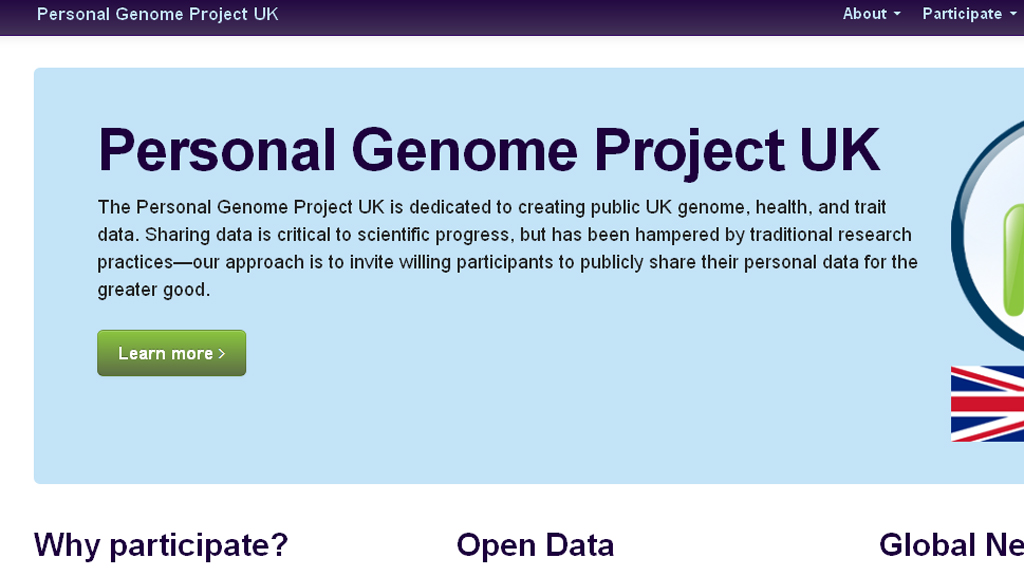Database seeks volunteers to bare all – genetically
Wanted: 100,000 volunteers willing to give up the secrets of their DNA for the public good. Channel 4 News speaks to the man behind the creation of a UK database of human genes.

Registrations have opened in the UK for the Personal Genome Project (PGP), which aims to create a massive online database to serve as a scientific resource.
The PGP will differ from previous genome projects in two fundamental ways: the information gathered will be totally open to all, rather than a small group of medical researchers, and the participants will be self-selected volunteers from the general public, rather than those suffering specific illnesses.
The man leading the project in the UK, Professor Stephan Beck of the Cancer Institute at University College London, has already put himself down to be a volunteer.
He told Channel 4 News: “I’m very interested to find out what my genome holds – it’s a natural extension of my research”.
Drawbacks
This “open consent” project makes no attempt to disguise the potential risks of taking part, including a warning that: “in principle, anyone with sufficient knowledge could take a participant’s genome and/or other personal information and use them to.. make synthetic DNA corresponding to the participant and plant it at a crime scene.”
Other possible risks include the ability to work out who the participant’s blood relatives are, the possibility of negative effects on employment or insurance, or finding out that a participant might be likely to suffer an incurable disease.
Currently the UK insurance industry has a moratorium on the use of genetic information in determining whether to insure individuals.
Dr Anna Middleton from the Wellcome Trust Sanger Institute is an Ethics Researcher who has gathered attitudes from just under 7,000 people from across the world towards learning information contained in their own genes. She has found that nearly 100% of participants thought that it should be possible to receive information relating to serious or life-threatening conditions that were treatable. But there was much less interest when the condition was known to not be treatable.
But Dr Vivienne Nathanson of the British Medical Association told Channel 4 News that people should think very carefully about taking part: “it’s complicated, because even though the project is relatively explicit, when we think about data we don’t know what use it could be put to in the future.
“There is no doubt that some genetic information will become enormously important.”
Control group
So why do it? 450 people have already pre-registered to take part, and a steady stream of new volunteers is coming through. Professor Beck assumes the motivation is partly altruism, partly what the project terms self-curiosity. And he is in no doubt about the potential value of the project:
“We need data to link medical records and genomics. Currently that is only happening under managed access – and that will slow down the development of data.. I think it’s critical to have a control group.”
To take part, volunteers have to be over 18 and not one of a pair of identical twins (unless both are volunteering).
All volunteers are sent material to study, informing them of the potential implications of their involvement and then have to pass a test to ensure they have understood what they are getting into.
Based on what has happened in the USA, where the project is already up and running, Professor Beck anticipates that the volunteers “will be biased towards those who are enthusiastic about science, but the 3,000 registered globally are from all walks of life – you don’t have to have a degree in genetics to take part.”
Medical advances
And researchers in the field are already excited at the prospect being able to access such a potentially large database. Geneticist Dr Jess Buxton of the Progress Educational Trust said: “The findings of the PGP and other genomic database projects will be key to understanding the relationships between genes, health and disease – knowledge that will have a real impact on healthcare for future generations.”
The project, which only has start-up funding in the UK, will be able to sequence the genomes of the first 50 participants. They will then be sent the results, with a report on how to interpret them, and then have the opportunity to withdraw from the project and have those results deleted. Otherwise, the data will go online within four weeks.
Future progress will depend on the ability of the project to raise funding from donors or the state.
-
Latest news
-
Fans react to football clubs increasing season ticket prices4m

-
‘We’re still a long way from justice’, says infected blood scandal victim5m

-
Infected blood scandal: Victims set to receive billions of government compensation7m

-
Iran’s president and foreign minister missing after helicopter crash3m

-
Yungblud launches his own affordable music festival5m

-




